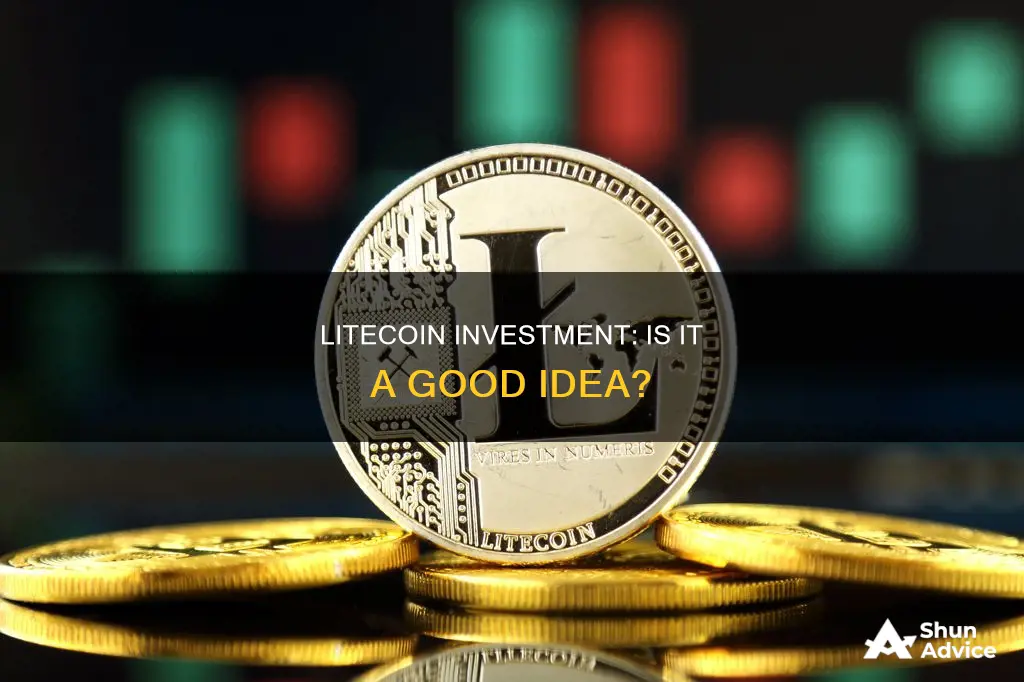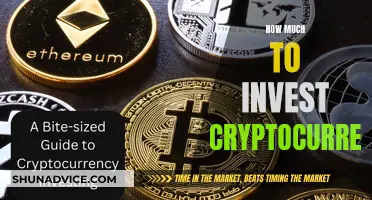
Litecoin is a cryptocurrency, often referred to as the silver to Bitcoin's gold. It was created in 2011 by former Google employee Charlie Lee and is one of the oldest and most popular cryptocurrencies on the market. Litecoin is currently the 14th largest cryptocurrency by market capitalization, with a total value of more than $12.3 billion.
Litecoin is known for its fast transaction times and low fees. It can process up to 56 transactions per second, compared to Bitcoin's seven, and transaction fees are usually just a few pennies.
As of 2021, Litecoin was accepted by more than 3,000 businesses and stores worldwide and was listed on nearly every cryptocurrency exchange.
So, is it a good investment? Well, that's a tricky question. Like all cryptocurrencies, Litecoin is very volatile. Its value has experienced wild swings during its 10-year lifespan, and it has historically struggled to get out of Bitcoin's shadow. However, it has consistently ranked in the top 15 cryptocurrencies by market cap, making it relatively stable compared to other altcoins.
If you're thinking of investing in Litecoin, it's important to do your research and only invest what you can afford to lose.
| Characteristics | Values |
|---|---|
| Cryptocurrency type | Altcoin |
| Cryptocurrency category | Digital Silver |
| Cryptocurrency ranking | 14th largest coin by market capitalisation |
| Cryptocurrency value | $72 as of August 2024 |
| Cryptocurrency supply | 84 million LTC |
| Cryptocurrency block generation time | 2.5 minutes |
| Cryptocurrency transaction speed | 56 transactions per second |
| Cryptocurrency transaction fees | A few pennies |
| Cryptocurrency block times | 2 1/2 minutes |
| Cryptocurrency transaction energy consumption | 3% of a Bitcoin transaction |
| Cryptocurrency exchange listing | Listed on nearly every cryptocurrency exchange |
| Cryptocurrency business acceptance | Accepted by more than 3,000 businesses and stores worldwide |
| Cryptocurrency wallet | Hardware or software wallet |
| Cryptocurrency investment risk | High-risk, high-reward |
What You'll Learn

Litecoin's transaction speed and low fees
Litecoin is known for its fast transaction times and low fees. The network can process up to 56 transactions per second, compared to just seven for Bitcoin.
Litecoin's transaction speed is 2.5 minutes, compared to 10 minutes for Bitcoin. This is because Litecoin's network batches transactions into blocks every 2.5 minutes, whereas Bitcoin's network does so every 10 minutes. Litecoin's faster block generation speed means it can process more transactions in a given time period.
The average transaction fee for Litecoin is around $0.04, compared to $7.6 for Bitcoin and $0.88 for Ethereum. The lower fees are partly due to the faster transaction speeds, as well as incentives for miners to process transactions faster.
The faster transaction speeds and lower fees have made Litecoin a popular alternative to other digital payment methods.
A Beginner's Guide to Investing Bitcoin in Singapore
You may want to see also

The potential for Litecoin to eclipse Bitcoin
Litecoin is often referred to as the silver to Bitcoin's gold. Both assets have a hard-capped supply that gives them a scarcity similar to precious metals. Litecoin is also based on the Bitcoin protocol code, but with a faster blockchain and lower reward per block.
Litecoin has a maximum supply of 84 million LTC, four times that of Bitcoin. It also has faster transaction times, with the network able to process 56 transactions per second compared to Bitcoin's seven. Transaction fees are also much lower, usually a few pennies compared to a few dollars for Bitcoin.
Litecoin is also more energy-efficient, with each transaction consuming just 3% of the energy it takes to process a Bitcoin transaction. It is also accepted by more than 3,000 businesses and stores worldwide, and is listed on nearly every cryptocurrency exchange.
However, as of August 2024, Litecoin is ranked between 14th and 20th in terms of market capitalisation, compared to Bitcoin, which is ranked first.
Litecoin's founder, Charlie Lee, sold his stake in the cryptocurrency in 2017, which has affected investor confidence. Litecoin also faces competition from newer cryptocurrencies that offer similar benefits.
While Litecoin has historically been a good investment, its technology is arguably outdated, and it is not clear whether it will be able to find its place in the market.
Litecoin has several advantages over Bitcoin that could allow it to eclipse its rival in the future.
Firstly, it has faster transaction times and lower fees, making it more suitable for global payments and cross-border money transfers. If Litecoin continues to be adopted by more merchants and consumers worldwide, it could generate further demand and increase its price potential.
Secondly, Litecoin is more energy-efficient than Bitcoin, which could become increasingly important as the world moves towards more sustainable energy sources.
Finally, Litecoin's close ties to Bitcoin could also work in its favour. As a testbed for upcoming second-layer applications that will eventually be applied to Bitcoin, Litecoin could benefit from any increase in Bitcoin's value or popularity.
However, there are also several factors that could prevent Litecoin from eclipsing Bitcoin.
Bitcoin has much greater institutional adoption and better security than Litecoin, which could make it a more attractive investment for those looking for a long-term store of value.
Litecoin also faces competition from newer cryptocurrencies that offer similar or improved benefits. Its infrastructure is no longer unique, and it has been described as a dinosaur coin.
Finally, the sale of Charlie Lee's stake in 2017 has affected investor confidence, and there is uncertainty about Litecoin's future following this departure.
In conclusion, while Litecoin has several advantages over Bitcoin that could allow it to eclipse its rival, there are also several challenges and uncertainties that could hold it back. It remains to be seen whether Litecoin will be able to capitalise on its strengths and overcome the competition to become the leading cryptocurrency.
The Lightning Network: Bitcoin's Future and How to Invest
You may want to see also

Litecoin's market cap and investment value
Litecoin (LTC) is a cryptocurrency that was designed to provide fast, secure and low-cost payments by leveraging blockchain technology. It is considered the silver to Bitcoin's gold.
Litecoin's market cap in early 2020 was the highest ever recorded, topping ten billion US dollars, a 100% increase since August 2019. This is calculated by multiplying the total number of Litecoins in circulation by the price of Litecoin. As of January 2021, Litecoin is one of the most widely accepted cryptocurrencies, with more than 2,000 merchants and stores accepting LTC worldwide.
As of May 2024, the live Litecoin price is $63.28 USD, with a 24-hour trading volume of $312,310,614. It has a market cap of $4,739,140,164, a circulating supply of 74,886,219 LTC coins, and a maximum supply of 84 million LTC coins.
Litecoin's affordability and stability make it an excellent option for those looking to get into alternative cryptocurrencies. Its lightning-fast transaction times, low transaction fees, and energy efficiency make it a popular medium of exchange for funds and transfers.
Small Bitcoin Investments: Worth the Risk?
You may want to see also

How to invest in Litecoin
Litecoin is a cryptocurrency, designed for payment processing at scale. It is one of the oldest cryptocurrencies on the market and is currently the 14th largest by market capitalisation.
If you are looking to invest in Litecoin, there are a few ways to do so. Firstly, you can buy it directly from an individual, either in person or over the web. However, it is important to exercise caution when doing so, as there is no guarantee that the trade will go through. Another option is to use a crypto ATM, but these can be hard to find and often have high rates.
The easiest way to purchase Litecoin is through a cryptocurrency exchange. Some of the most popular exchanges include Coinbase, Kraken, Interactive Brokers, eToro, Webull, Binance, Gemini, and Coinmama. To use an exchange, you will need to create an account and add a payment method. You will also likely need to verify your ID, which may take some time. Once your account is set up, you can place an order to buy Litecoin, either at the current market rate or at a specified price. After placing your order, you will be able to see the Litecoin in your exchange wallet.
It is worth noting that cryptocurrency is a largely unregulated market, so it is important to exercise caution when investing. It is recommended that Litecoin makes up only a small percentage of your overall investment portfolio.
Bitcoin Investors: Are They Destined for Wealth?
You may want to see also

The risks of investing in Litecoin
Investing in cryptocurrencies like Litecoin can be risky due to the volatility of the market. Here are some key risks to consider before investing in Litecoin:
Competing Altcoins
Litecoin was one of the first altcoins to expand upon Bitcoin's network, offering faster and more affordable transactions. However, many other cryptocurrencies have since emerged, offering similar or even improved benefits at lower prices. These competing altcoins can potentially erode Litecoin's market share and impact its growth prospects.
Shaky Faith in Leadership
Litecoin's founder, Charlie Lee, sold his stake in the project in 2017, citing a conflict of interest. This move has raised questions about leadership's faith in the coin's future and may have affected investor confidence. Lee's decision to sell his holdings could make potential investors cautious about investing in Litecoin.
Volatile Price Swings
Litecoin's value has experienced wild swings during its lifespan. Spikes in its price have been followed by rapid sell-offs, creating a highly volatile investment environment. This volatility can make it challenging for investors to time their entries and exits, potentially leading to significant losses if not managed carefully.
Security Concerns
While Bitcoin is known for its robust decentralisation and resistance to 51% attacks, Litecoin lags behind in hash power. The Litecoin network struggles to attract new users in the competitive altcoin space, potentially impacting its security. A less decentralised network increases the risk of a successful 51% attack, which could have detrimental effects on the currency's value and investor confidence.
Outdated Technology
Litecoin's technology, which was innovative when it debuted in 2011, is now relatively outdated. Newer blockchain innovations, such as Stellar Lumens, offer improved scalability and efficiency compared to Litecoin. This technological obsolescence could impact Litecoin's ability to remain competitive in the rapidly evolving cryptocurrency market.
Bitcoin: A Sound Investment or Risky Gamble?
You may want to see also
Frequently asked questions
Litecoin (LTC) is an open-source, peer-to-peer cryptocurrency designed for payment processing at scale. It is one of the oldest cryptocurrencies on the market and is currently the 14th largest coin by market capitalization, with a total value of more than $12.3 billion.
You can invest in Litecoin by mining or buying LTC online. You can buy LTC on Interactive Brokers or eToro, or on exchanges such as Coinbase, Coinmama, Binance, or Gemini.
Litecoin has lower transaction costs and faster transaction speeds compared to Bitcoin. It is also more scalable than Bitcoin and Ethereum. Additionally, Litecoin is generally considered to be a good investment for those who do not want to invest in Bitcoin but are interested in other altcoins.
Investing in Litecoin can be risky due to the volatility of the cryptocurrency market. Additionally, Litecoin has historically had a hard time getting out of Bitcoin's shadow, and it does not offer anything unique when compared to other cryptocurrencies like Ethereum and Cardano.







